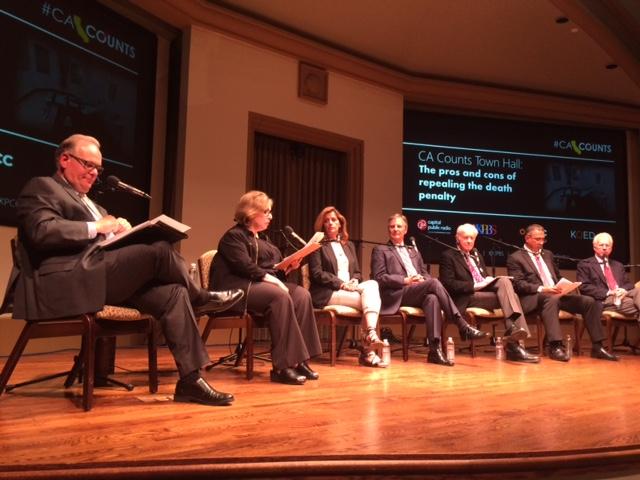In California, 743 inmates are on death row; a significantly higher number than in any other state. Yet, the most recent execution here took place in 2006. Death penalty cases regularly last up to 25 years, costing taxpayers millions of dollars, annually. On the evening of Sep. 7, six panelists sat side-by-side in front of a small audience in a heated debate about the merits of upcoming California ballot Propositions 62 and 66, both of which aim to alter these statistics. The forum, held at the University of San Diego, was part of the California Counts series, for which California public media stations KPBS, KPCC, KQED, and California Public Radio have teamed up to offer special coverage of election issues. Wednesday’s conversation focused primarily on Proposition 62, which would abolish the death penalty in California, reducing maximum sentences from capital punishment to ‘life in prison without the possibility of parole.’ Proposition 66 aims to shorten the sentencing process and reduce costs associated with the death penalty.
To open the panel, hosts Larry Mantle from KPCC and Maureen Cavanaugh from KPBS introduced Beth Webb, whose sister died in a mass shooting in Seal Beach in 2011. She took a deep breath before launching into an emotional defense of abolishment. “I don’t believe that two wrongs make a right,” she said. “ I am better than [my sister’s killer].” On her right sat Marc Klaas, whose daughter was kidnapped and killed in 1993. He was a more polished speaker, detailing his daughter’s kidnapping at age 12 and arguing that her murderer “has no business breathing the air we breathe. He has no business being on the same planet we’re on.” He posited that abolishing the death penalty could prove a slippery slope, with life sentences eventually abolished also on the basis of cruelty. The audience scoffed at some of his arguments through the forum. During the audience Q&A that followed the debate, he suggested that the solution to racial injustice in the penal system is not to execute fewer minority inmates, but rather to execute more white ones. In response, Webb said that her sister would have disagreed with that assessment, prompting a sustained cheer from the crowd. However, in the final remark of the formal debate, Klaas brought the room to a standstill. “He spends his time thinking about victims of his past crimes and jerking off at least twice a day,” he said, to an accompanying gesture. “As long as this individual is there doing that, my daughter has no peace.”
Paul Pfingst, former San Diego County district attorney, took what he considers a more pragmatic view. While life in prison without the possibility of parole costs Californians $11,000,000 each year, the death penalty costs us much more: $184,000,000, according to Mike Farrell, co-author of Proposition 62. Pfingst argued in favor of Proposition 66, which aims to cut these costs by speeding up the sentencing process. The moderators pointed out that one of the proposed mechanisms for saving time is allowing the court to appoint appellate lawyers to cases, even when those lawyers are inexperienced or uncomfortable with death penalty cases. Pfingst was forced to admit, “I don’t think that it is wise to compel someone to get involved with death penalty litigation.”
Justin Brooks, executive director of the California Innocence Project, also took issue with the idea of shortening the process. “Thank God there’s a lot of delays in the justice system,” he said. “…these cases can take 15, 20 years to litigate and ultimately there’s findings of innocence, so without that kind of process and procedure, a lot of innocent people would be executed.”
Farrell, meanwhile, is opposed to the death penalty on principle. “I’m a little tired of hearing this stuff about ‘the law,’” he said. “The law was once that black people were slaves. We changed that law because we understood finally that that was not elevating us to the position that we wanted to be as a society.”
On Nov. 8, voters in California have the opportunity to, again, redefine our society.
To listen to the full recording of the formal debate, visit http://www.kpbs.org/news/2016/sep/08/repeal-death-penalty-6-quotes-yes-and-no-campaigns/

